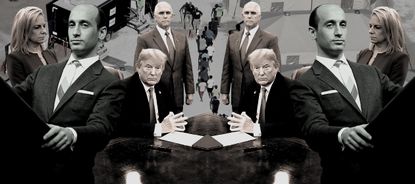Trolls at the border
Trump's child separation policy was purposefully designed to be met with outrage. Here's why.


So this time the White House really lost a battle, right?
In the wake of overwhelming public pushback against his deeply-unpopular policy of separating children from their migrant parents, President Trump on Wednesday signed an executive order to allow detained families to be housed together. Given how reluctant this administration is to ever admit error, backing down in this manner would seem to suggest that the administration grossly miscalculated.
Such a comforting conclusion is unfortunately premature.
Subscribe to The Week
Escape your echo chamber. Get the facts behind the news, plus analysis from multiple perspectives.

Sign up for The Week's Free Newsletters
From our morning news briefing to a weekly Good News Newsletter, get the best of The Week delivered directly to your inbox.
From our morning news briefing to a weekly Good News Newsletter, get the best of The Week delivered directly to your inbox.
First of all, it's too soon to call the president's executive order a retreat. The order almost seems designed to run afoul of immigration law — specifically, the Flores consent decree that forbids detaining minor children indefinitely. If the president's order is challenged in court and his zero-tolerance policy is kept in place, families would continue to be torn apart, but Trump could turn around and blame high-handed judges for ordering children pulled from their parents' arms, just as he had previously blamed the Democrats for causing the crisis by not funding his beloved wall.
But even if the administration ultimately does retreat, and at least temporarily abandon its zero-tolerance policy, that doesn't mean the White House was denied what it really wanted: outrage.
The Atlantic's McCay Coppins calls the policy's principal architect, Stephen Miller, the administration's troll-in-chief, and it's an apt description to apply to the policy itself. That policy wasn't accidentally implemented in a way that provoked anger at its excessiveness and cruelty. On the contrary: No attempt was made to implement that policy with a view to efficiency, effectiveness, or minimizing either the practical or political fallout. It was actively trying to be what we would normally call "unwise."
Why do that? Precisely because it sharpens political divisions and thereby breaks down the process of deliberation. That's trolling.
We're familiar with trolls in the online world, where they can easily destroy fora for deliberation by making them inhospitable to people who want to deliberate, so that those people eventually leave. Moderated fora face a constant challenge to maintain enough openness to allow for a free and unbiased exchange of ideas without turning those spaces into a breeding ground for trolls.
But a troll takeover is almost universally deplored by those who once valued a forum destroyed by them. Why, then, should trolling ever work politically? Why shouldn't their behavior always be counter-productive, a problem for their co-partisans rather than their opponents? The answer has to do with the deformation of our politics, and the breakdown of our political community.
Members of a political community generally share a set of values, habits, and principles that define the ethos of the community. But, inevitably, these exist in tension with one another. We want freedom and security and equality and a variety of other goods that cannot all be maximized simultaneously. So simply following a rule — whether derived from reasoned principle or from habit — is insufficient to resolve all potential conflicts. That's why political communities require leadership that manifests good judgment — what Aristotle called phronesis or practical wisdom. In a well-ordered democratic republic, prospective leaders use argument to convince the public that a given course of action strikes that proper balance — or, more correctly, that he or she is the right person to discern that balance.
But when the political community breaks down — when there is no longer a shared conviction on what we value — that process of phronesis breaks down as well. Public argument is no longer about how best to achieve our collective ends, nor even about which ends are more important, but first and foremost a demonstration of fidelity. Which is to say, not an argument at all.
Good judgment should not be confused with compromise or moderation. "Extremism in defense of liberty is no vice" is an argument for being more vigilant about protecting liberty than about securing other goods (such as alleviating poverty or social injustice). It presumes a shared appreciation of liberty. Dick Cheney's "1-percent doctrine" towards the possibility of nuclear terrorism is, similarly, an argument for extremism that presumes a shared appreciation of security. These arguments may be persuasive or not — and they may have been wise or not — but they are intended to persuade. If the targets conclude that these arguments show bad judgment, they will be rejected.
Trolling has different goals. Its governing assumption is that opponents do not have a shared appreciation of the value in question, and it aims to expose that divide. And that exposure is far more important than any other aim, including even realizing the objective of the policy.
Which brings me back to Stephen Miller.
He characterizes his opponents as believing in open borders and rejecting the idea of an American nation. His primary policy aim is not to convince them otherwise, nor even to secure the border from illegal entry. Rather, the objective is to demonstrate the administration's fidelity to its own values, and to force others by their very outrage to demonstrate their opposition to those values. As Coppins writes, "for Miller, the public outrage and anger elicited by policies like forced family separation are a feature, not a bug."
If that's Miller's goal, then wise policymaking is not only unnecessary but actually counter-productive. The worse the policy, the more sure it is to be furiously opposed — and thereby to reinforce the division of the country into mutually hostile and unpersuadable camps. But a moderate response to such a policy is arguably worse, as it effectively rewards the strategy of trolling and encourages its repetition.
This is the dilemma on whose horns the opposition to Trump has been impaled since he first emerged as a political force, and even a leader well-endowed with phronesis might hesitate to chart an escape. In the land of trolls, wisdom itself is a sign of weakness.
Create an account with the same email registered to your subscription to unlock access.
Sign up for Today's Best Articles in your inbox
A free daily email with the biggest news stories of the day – and the best features from TheWeek.com
Noah Millman is a screenwriter and filmmaker, a political columnist and a critic. From 2012 through 2017 he was a senior editor and featured blogger at The American Conservative. His work has also appeared in The New York Times Book Review, Politico, USA Today, The New Republic, The Weekly Standard, Foreign Policy, Modern Age, First Things, and the Jewish Review of Books, among other publications. Noah lives in Brooklyn with his wife and son.
-
 Is the next cold war a drone-swarm race between US and China?
Is the next cold war a drone-swarm race between US and China?Today's Big Question Both global superpowers are building up their capacity for surging robotic warfare. What happens next is anyone's guess.
By Rafi Schwartz, The Week US Published
-
 Crossword: April 17, 2024
Crossword: April 17, 2024The Week's daily crossword
By The Week Staff Published
-
 Sudoku hard: April 17, 2024
Sudoku hard: April 17, 2024The Week's daily hard sudoku puzzle
By The Week Staff Published
-
 Arizona court reinstates 1864 abortion ban
Arizona court reinstates 1864 abortion banSpeed Read The law makes all abortions illegal in the state except to save the mother's life
By Rafi Schwartz, The Week US Published
-
 Trump, billions richer, is selling Bibles
Trump, billions richer, is selling BiblesSpeed Read The former president is hawking a $60 "God Bless the USA Bible"
By Peter Weber, The Week US Published
-
 The debate about Biden's age and mental fitness
The debate about Biden's age and mental fitnessIn Depth Some critics argue Biden is too old to run again. Does the argument have merit?
By Grayson Quay Published
-
 How would a second Trump presidency affect Britain?
How would a second Trump presidency affect Britain?Today's Big Question Re-election of Republican frontrunner could threaten UK security, warns former head of secret service
By Harriet Marsden, The Week UK Published
-
 'Rwanda plan is less a deterrent and more a bluff'
'Rwanda plan is less a deterrent and more a bluff'Instant Opinion Opinion, comment and editorials of the day
By The Week UK Published
-
 Henry Kissinger dies aged 100: a complicated legacy?
Henry Kissinger dies aged 100: a complicated legacy?Talking Point Top US diplomat and Nobel Peace Prize winner remembered as both foreign policy genius and war criminal
By Harriet Marsden, The Week UK Last updated
-
 Trump’s rhetoric: a shift to 'straight-up Nazi talk'
Trump’s rhetoric: a shift to 'straight-up Nazi talk'Why everyone's talking about Would-be president's sinister language is backed by an incendiary policy agenda, say commentators
By The Week UK Published
-
 More covfefe: is the world ready for a second Donald Trump presidency?
More covfefe: is the world ready for a second Donald Trump presidency?Today's Big Question Republican's re-election would be a 'nightmare' scenario for Europe, Ukraine and the West
By Sorcha Bradley, The Week UK Published